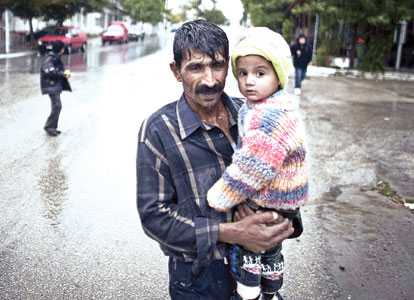Asylum seekers have been returned to Baghdad after a temporary suspension of repatriation flights
Owen Bowcott

The first group deportation of Iraqis for six months has seen a number of asylum seekers returned to a country convulsed by civil rights protests and violence.
The decision to resume charter flights was in defiance of warnings by the United Nations high commissioner for refugees that it is unsafe to remove people to Baghdad and central Iraq.
The plane, organised by the UK Borders Agency in conjunction with the Swedish government and the EU border agency Frontex, left Stansted airport at 7am on Wednesday. Last-minute appeals on behalf of other failed asylum seekers prevented several others from being forcibly repatriated. It is not known how many deportees from Sweden were on board.
Charter flight removals to Baghdad were temporarily suspended last October after the European court of human rights ruled that a surge in sectarian violence and suicide bombings made Baghdad and the surrounding area too dangerous.
The Home Office has since pledged to “continue to undertake” deportations but acknowledged that, in cases where the Strasbourg court supported petitions from individuals demonstrating that they were at risk, it would not enforce removal.
Refugee organisations said that as many as 17 people had been deported, but the Home Office maintained that only eight had gone.
Protesters in Baghdad and northern Iraq are staging “Arab spring”-style protests against corruption, poor services and lack of employment. As many as 30 demonstrators have been killed in the capital and the Kurdish city of Suleimaniya since mid-February as authorities have suppressed dissent.
The UNHCR has criticised European states, including the UK, that have sent Iraqis back to the five central governorates, or provinces, including Baghdad. “We are very concerned about reports that the Home Office has returned Iraqis to Baghdad,” a spokeswoman for the UNHCR said. “The situation for minorities [such as Christians] in Iraq is very precarious. There has been a deterioration in security.”
The International Federation of Iraqi Refugees, which monitors removals, said the resumption of charter flights had been done at a time when attention was focused on Libya.
“The UK government, while it is saying how much it supports democracy and human rights in Libya, continues to support the corrupt governments in Iraq and Kurdistan (sic),” said a spokesman. “Now it is deporting people, many of whom left to flee this same government violence, into the middle of it. It is a criminal hypocrisy and must be stopped.”
A Home Office spokesman said: “The UK courts have confirmed that we are able to return people to all of Iraq and that the return of Kurdish Iraqis via Baghdad does not expose them to serious harm. The UK Border Agency would prefer that those with no legal basis to remain in the UK leave voluntarily. Where they do not, we will seek to enforce their removal.”

